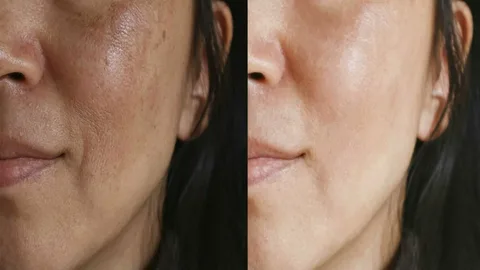
Have you noticed redness, irritation, or uneven patches on your skin and wondered, why is my face blotchy?
Blotchy skin on face can result from various causes, such as allergies, skin conditions, infections, or environmental factors. While some instances of clear up on their own, others may signal an underlying medical issue that needs attention.
At Frisco ER, we specialize in diagnosing and treating skin concerns. Our goal is to help you achieve clearer, healthier skin.
This guide explains what causes blotchy skin on the face, effective treatments, and when to seek professional care.
What Causes Blotchy Skin on the Face?
1. Skin Conditions That Cause Blotchy Skin
Certain skin conditions are common culprits of blotchy skin face symptoms:
- Rosacea – A chronic skin condition that causes redness, visible blood vessels, and bumps. It is often triggered by heat, alcohol, stress, and spicy foods.
- Eczema (Atopic Dermatitis) – Causes dry, inflamed, itchy skin, often resulting in blotchy skin on the face.
- Psoriasis – A condition where the immune system speeds up skin cell production, causing scaly, red patches on the skin.
2. Allergic Reactions and Sensitivities
- Hives (Urticaria) – Raised, itchy patches that develop due to food allergies, insect bites, or medication reactions.
- Contact Dermatitis – A reaction caused by allergens or irritants in makeup, skincare products, or household detergents.
3. Environmental Factors That Affect Skin
- Sun Exposure – Too much sun can lead to red, irritated skin, and sometimes long-term discoloration.
- Cold and Windy Weather – Harsh weather conditions strip moisture from the skin, making it dry and uneven.
- Air Pollution – Pollutants in the environment can clog pores and lead to inflammation, worsening blotchy skin face issues.
4. Medical Conditions That May Cause Blotchy Skin
- Lupus – An autoimmune disease that can cause a butterfly-shaped rash across the cheeks.
- Hormonal Imbalances – Changes in hormone levels due to pregnancy, menopause, or thyroid disorders can contribute to blotchy skin on the face.
- Liver Disease – In some cases, what is blotchy skin a sign of? It could indicate liver dysfunction, affecting skin health.
5. Infections and Skin Irritations
- Bacterial and Fungal Infections – Conditions like impetigo or ringworm can result in a blotchy face.
- Heat Rash – Common in humid conditions, caused by sweat getting trapped under the skin.
- Viral Rashes – Some viral infections, such as measles or chickenpox, can present as blotchy skin face symptoms.
How to Treat Blotchy Skin on the Face
1. Home Remedies and Lifestyle Changes
For mild cases, these steps can help alleviate blotchy skin face concerns:
- Follow a Gentle Skincare Routine – Use fragrance-free, non-irritating products and avoid harsh exfoliants.
- Stay Hydrated – Drinking enough water helps maintain skin elasticity and prevents dryness.
- Moisturize Regularly – Keeping your skin hydrated can reduce irritation and flakiness.
- Apply Sunscreen Daily – Protecting your skin from UV damage helps prevent blotchy skin on the face.
2. Over-the-Counter Treatments
- Antihistamines – Relieve blotchy face symptoms caused by allergic reactions.
- Hydrocortisone Cream – A mild steroid that reduces inflammation and redness.
- Vitamin C and Niacinamide Serums – Can help brighten skin and even out tone.
3. Medical Treatments at Frisco ER
If home remedies do not improve blotchy skin face symptoms, medical evaluation may be necessary. Frisco ER provides:
- Prescription Medications – Stronger antihistamines, corticosteroids, or antifungal treatments for severe cases.
- IV Therapy – Helps with hydration and nutrient deficiencies.
- Allergy Testing – Identifies triggers contributing to blotchy skin on the face.
- Infection Treatment – Antibiotics or antifungal medications if an infection is causing blotchy skin face symptoms.
When Should You Visit the Frisco ER?
Although many causes of blotchy skin on the face are mild, seek medical care if you experience:
- Sudden swelling, difficulty breathing, or severe itching – Possible signs of anaphylaxis, a life-threatening allergic reaction.
- A spreading rash accompanied by fever or chills – Could indicate a bacterial or viral infection.
- Severe pain or burning sensation – Suggests an underlying issue that requires immediate attention.
- Persistent blotchiness that does not improve – If symptoms persist despite treatment, consult a medical professional.
Effective Face Blotchy Treatment! If redness or irritation is affecting your skin, get expert care at Frisco ER for quick relief!
Conclusion
Face blotchy can result from many factors, including skin conditions, allergic reactions, infections, and environmental triggers. While some causes are mild and temporary, others may indicate an underlying medical condition that requires professional attention.
Taking care of your skin by staying hydrated, using gentle skincare products, and protecting yourself from sun exposure can help prevent blotchiness. However, if your symptoms persist, worsen, or are accompanied by severe reactions such as swelling, fever, or difficulty breathing, it’s important to seek medical care.
Understanding what causes can help you take the right steps to treat and prevent future occurrences. If needed, consult a healthcare professional to determine the best treatment for your specific condition.
At Frisco ER, we’re here to provide expert treatment for a wide range of conditions, including skin issues like blotchy skin. Our experienced medical team is available 24/7 to assess your symptoms and offer personalized care to help you feel better quickly. Contact for emergency care.
Frequently Asked Questions (FAQs)
1. Why is my face blotchy all of a sudden?
Sudden blotchiness can result from an allergic reaction, skin irritation, sun exposure, or an underlying health condition. If it persists, seek medical care.
2. What is blotchy skin a sign of?
It may indicate skin sensitivity, an allergic reaction, an infection, or an autoimmune disease such as lupus.
3. How can I prevent blotchy skin on my face?
Use gentle skincare products, apply sunscreen, stay hydrated, and avoid known allergens.
4. Can stress cause blotchy skin?
Yes, stress can trigger inflammation and worsen skin conditions, leading to redness and uneven pigmentation.
5. Can certain foods cause blotchy skin?
Certain foods can cause blotchy skin, especially in people with allergies or sensitivities. Dairy, gluten, nuts, and shellfish are common triggers. These reactions often result from histamine release or inflammation. If blotchiness occurs after eating specific foods, tracking your diet and consulting a doctor can help identify the cause.





Leave a Reply